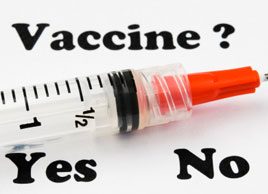Is it safe to get the flu shot?
While medical professionals strongly recommend the flu shot, some people remain concerned about the vaccine. But are these fears valid? We asked the experts if it’s safe to get the flu shot

Source: Web exclusive, January 2011
Medical professionals want you to get the flu shot‘if not for you, then to prevent the spread of the virus and to help protect the rest of us. Yet many Canadians are still hesitant to get the vaccine when flu season rolls around. Best Health turned to the experts to help weigh the pros and cons of getting the flu shot.
"I do strongly support people getting it," says Dr. Patricia Mirwaldt, board member of the BC College of Family Physicians. "The more people who get it, the less susceptibility there is in the population."
While getting the flu may mean a week of feeling crummy for some, it can be a very serious illness for those with compromised immune systems. Elderly people, diabetics, children, those with cancer, liver or heart problems, and people who suffer from illnesses that target the immune system, such as HIV, are particularly at risk, as are individuals taking biologic drugs, such as those used to treat arthritis. The World Health Organization estimates that influenza epidemics result in up to half a million deaths every year.
Understanding the risks
As dangerous as the flu can be, some people are still reluctant to get the annual shot for fear of associated risks. But are these concerns well-founded?
"The risks involved in getting the vaccination are very small," says Dr. Brian Schwartz, director of emergency management support for the Ontario Agency for Health Protection and Promotion. "[But] there are real risks associated with the flu shot, as with any medical intervention, medication or vaccine."
The most common side effect from the flu vaccine is soreness in the arm and/or mild flu-like symptoms, which is actually an indication that your immune system is reacting to the vaccine. One in 100,000 people will have a serious negative reaction, such as anaphylaxis. Yet people express much greater fears about the safety of the vaccine. Here are the ones that doctors most often hear:
Fear of neurological disorder
"The risks that people are more concerned about are the neurological risks," says Schwartz. "I still hear people ask, ‘How do I know the flu shot is safe?’" Their concerns are not necessarily unfounded. In 1976, after an outbreak of swine flu in New Jersey, it was falsely reported that the vaccine killed more people than the flu itself. However, investigations revealed that there was no causal relation between the vaccine and any deaths.
The 1976 incident left a mark on the public view of vaccines because more than 500 people who received the New Jersey flu shot developed Guillain-Barré syndrome (GBS). This neural disorder in which the body’s immune system attacks its nerves, is usually preceded by a viral infection. It is highly treatable ban can result in death in its most severe form.
GBS struck an estimated one in 100,000 of those vaccinated in 1976 and a very slight risk remains: About one in a million people could develop the neurological disorder from the flu shot.
‘But to put this in perspective, your risk of dying in a car accident in Toronto is much greater,’ Schwartz points out, adding that GBS can also occur as a complication of the flu itself.
Fear that vaccines are linked to autism
The other fear that patients often express, Schwartz says, is that children could develop autism from a vaccination. ‘Those fears really should be well and done by now,’ he says. Autism fears in the UK derived from a research paper published in 1998 in the journal The Lancet that claimed a link between autism and the measles, mumps and rubella (MMR) vaccine. The journal has since retracted that paper and the lead researcher, Andrew Wakefield, has been stripped of his licence.
There are also fears that the presence of mercury in a preservative, thimerosal, which is used in the flu vaccine, could cause autism. The scientific consensus of bodies such as the Public Health Agency of Canada and the World Health Organisation is that there is no reputable scientific evidence that thimerosal causes autism.
The flu is more dangerous than the vaccine
Overall, Schwartz and Mirwaldt both stress that we have far more to fear from the flu itself than the vaccine. After all, the WHO has called the avian flu virus ‘sloppy, promiscuous, and capricious.’
‘It’s a pretty apt description’it explains why the flu mutates and comes back in a new form every year,’ says Schwartz. ‘Sloppy because when it mutates, it doesn’t replicate itself exactly; capricious because we cannot predict which way it’s going to mutate; and promiscuous because the human variety swaps genes with other flu viruses, including swine and avian varietes.’
This is why new vaccines need to be developed every year. However, experts can’t always be sure that the vaccine will always work perfectly because the formula is based on viruses spotted the previous year that epidemiologists expect will become problems the next year.
‘There’s always a little bit of a crap shoot [with the annual flu vaccine] because the influenza virus changes so quickly, so we can’t predict with 100 percent accuracy what will come down the pipe this year,’ says Mirwaldt. ‘But ultimately it is one of the most effective [preventative] mechanisms we can use.’
Don’t miss out! Sign up for our free weekly newsletters and get nutritious recipes, healthy weight-loss tips, easy ways to stay in shape and all the health news you need, delivered straight to your inbox.




